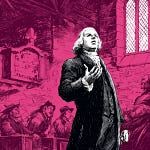Question 1: What is theology?
Answer: Theology is our practice of receiving God’s truth about himself and his works.
Theology is our practice of receiving God’s truth about himself and his works. If I could give you the one sentence summary of everything I intend to write on the topic of theology, that might well be it. If this whole book, and the series of books I intend to write (if God spares me) were a sentence, this would be the sentence. Every single thing I say here will unfold and practice this basic definition in some sense or another. This sentence represents a kind of fountainhead, if you will, from which every other theological thought in this work flows. With this in mind, before we start doing theology, I want to take a step back and introduce it a little – using my definition as a guide.
The first thing we see in this definition is our broader category. Theology is an act – the act of receiving. What this means is that it is both the mental apprehension of truth, and the acceptance of that truth in thought, heart, word, and deed. I call it a “practice” in recognition of the fact that we cannot and do not totally or fully receive God’s truth in this life. We constantly and continually strive to do so, but we do and will fall short, and always there will be more to receive.
Now this might all sound a bit weird to you, because you might have generally thought of theology as simply “study”. You know, theology is found in books. You read them, you study, and – if you’re a student – you write theology. Theology is a brain/study thing right? Ok, it’s true enough, study is a big part of theology. The word has “ology” in it after all, and with good reason. To my mind the idea of “receiving truth”, however, is much closer to what is and should be happening when we engage ourselves in this thing we call theology.
You see, knowing God is a much bigger thing than merely studying him. The devil knows much about God, and many a damned theologian has too, but in scripture we read: “He has told you, O man, what is good; and what does the LORD require of you but to do justice, and to love kindness, and to walk humbly with your God?” (Micah 6:8). Read 1 Samuel 3:7 for another example. It talks about the prophet Samuel as a boy who did not know the Lord because God had not revealed himself to him. Now the boy knew about God (he worked in the Temple after all), but he didn’t know God yet. God hadn’t spoken into his life to give him an experiential and relational knowledge of himself.
In other words, to know God is not just to know about him. It is to trust in him, to experience him, and to walk with him in faith and obedience in all of life. “Theology is narrower than religion or godliness, for theology is not the whole life of devotion, but specifically the engagement of the mind with truth as the foundation for the religious life” (Beeke & Smalley, RST Vol 1, p.41). Read the depth of spiritual experience in the psalms, for example. Read about the experiences of God’s people in the history of scripture – the amazement they felt when God delivered them through the Red Sea, the sufferings of Job, the profound and divine insight and wisdom of Solomon as he penned the Proverbs, the deep despair of Israel as they languished in captivity under God’s heavy hand of judgment and discipline. It is relationship that we are talking about here, and it has the goal of transforming us, and of saving and sanctifying our souls (Warfield, Studies in Theology, K.E.1104 – much more on this later!). Theology might be considered the “written component” of a life lived in the experience of knowing God.
Now that said, it’s still important that we say: theology is also study. You can’t do theology without engaging your mind. Study is an integral aspect of knowing God and relating to him. Why do I say this? Well, because it’s true of course! After all, when we’re doing theology we’re making propositions, using arguments, and exploring intellectually what we’re talking about. In short: what we are doing here is thinking. We are using our grey matter. Theology is not just study, but it certainly is study. And this is fair enough too – God gave us brains, and part of what it means to know him is to engage our brains and learn. It’s the same with any relationship – not just our relationship with God. In my marriage, for example, I’m not called to just float along in some fairyland of emotional bliss. I’m called to notice her preference for whether or not she likes the lid screwed back on the toothpaste. I am called to love her intelligently (1 Pt 3:7). Believe me, I speak from extensive experience and failure, if you try “loving” your wife without engaging your grey matter, you’re going to get shown up pretty quickly. You need to know who she is, what her preferences are, what makes her tick. In short, as some have said before, it’s your job to get a PhD majoring in your wife. But the real point here is that love, among other things, takes brains. Loving God requires the employment of our minds (2 Cor 10:5), and that’s what we’re doing when we write and study theology. We must love the Lord our God with all our heart, soul, strength, and mind.
So what am I really saying here?
I’m saying that all study of God (of which this book is a type) has to be done through this prism we call life experience. Theology just has to be and is, whether we like it or not, connected to life, and to the experience of loving God. It has to speak into our lives, it has to connect with our hearts, to be an expression of a heart that is connected to God – because that is the nature of the God we love. Theology, rightly practiced, will stir our affections and motivate us to a new way of life and obedience.
Knowing God, of course, is so much richer than just writing or reading a book, or studying for that matter. In that sense, theology is just one component of a much larger thing. Knowing God is life itself (Jn 17:3), it engages the emotions, the affections, the imagination, the body, the will – every part of us, and that experience is something beyond the words of any page or the studies of any scholar. Doing the work of study in theology is only one part of the rich spectrum of experience that we call knowing, loving, and living with our God – and that’s also crucial to hold before our minds as we do this deed of theology. Theology (at least according to my definition) is therefore useful but limited. It is by no means the be all and end all when it comes to knowing God (far from it – and thank God for that!).
So then, while we call this work of theology “study,” the theology I do here will be explored and written in a style that I hope reflects a living, loving knowledge of and relationship with God. This is what I really mean when I talk about theology being an act of receiving the truth. For example, as I write I will seek to engage our affections and motivate us into action.
I’m starting to wade into waters that are too deep for me. Have a read of this little extract from Mr Warfield, he gets to these things in a much better way than I do:
“…doctrine is in order to life, and that the study of doctrine must be prosecuted in a spirit which would see its end in the correction and edification of life…when one draws towards the journey’s end, and exchanges the trials of the pilgrimage for the last trial, “the river that hath no bridge,” why does he address himself in peace to die, this man who has been taught the evil of his own heart and the holiness of the judge of all?
It is because of doctrine.
He knows the covenant of peace, and the Mediator of it. He knows, and he knows it through revealed doctrine only, that to depart is to be with Christ, and is far better. He knows that the sting of death is sin, and the strength of sin is the law. But he knows, with the same certainty, that God giveth us the victory through our Lord Jesus Christ; and that His sheep shall never perish; and that He will raise up again at the last day him that has come to God through Him.
All this is doctrine.
If such is the value of doctrine, the systematic theologian is preeminently a preacher of the gospel; and the end of his work is obviously not merely the logical arrangement of the truths which come under his hand, but the moving of men, through their power, to love God with all their hearts and their neighbours as themselves; to choose their portion with the Saviour of their souls; to find and hold Him precious; and to recognize and yield to the sweet influences of the Holy Spirit whom He has sent.” (Warfield, Studies in Theology, K.E.1205 and previous).
Have I said all I need to say about this? I haven’t even scratched the surface. I trust, however, that these poor meanderings will give you enough to grasp what I’m attempting to get at here.
In short, don’t settle for intellectual theology, and do not be deterred if that is all you see in it as you begin your study. Prayerfully search for the deeper riches to be mined from the Word of God, searching as you do for wisdom as though it were silver (Pr 2:4). And spend more of your time with theologians whose writing displays this kind of vitality. I’m always on the lookout for theologians whose writing moves me and warms my heart toward Christ. The Puritans were the giants in this regard, and the gift of their literary labours in this respect has been – I think – unsurpassed in the history of the Church to his date. Read the Puritans!
But let me take a moment to address those of you who need no encouragement in theological pursuits. If reading theology is generally a burden to you, you can probably skip the next two paragraphs. If you can’t get enough theology, however, then read on! To theology lovers I say this: do not be tempted wrongly into the subtle allurement that comes with study and knowledge. All good things from God may become idols, including our ability to study, to think – even to think about theology. The godless scientist may experience something like the same ‘rush’ in his study that the theologian has in his. Don’t mistake the joy of your work for nearness to God, though both ought to be intertwined and enhanced by the other. You may be near to God in it, but it is no substitute for a living relationship with him. Let me put this point in a slightly different way because it’s important that we get this.
For those who have scholarly gifts in any measure, there is a certain rush that comes from learning, from studying, from exercising your mental strength. But don’t make an idol of it. Don’t mistake this rush for thinking that you are growing in godliness. Knowledge, when untempered by godliness, puffs up (1 Cor 8:1). By all means enjoy the study, enjoy it as you enjoy all good gifts of God. But always hold before you your chief goal: to know Christ, and to make him known. Even as I write these words I lament the shallowness of my own heart. How little my heart delights in his law (Ps 1:2). May God have mercy on me in my own studies! So let us use theology as one of the means by which we may know God more, knowing its limitations, and its (our) pitfalls. May we let our theology be, as Thornwell terms it, “a condition of life… a state of the soul which involves all the energies of our being” (Thornwell, Writings, p.38). SDG.














Share this post